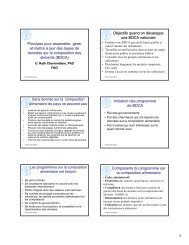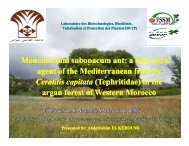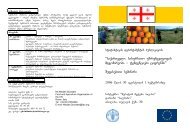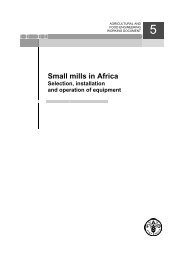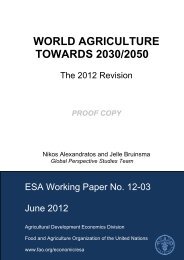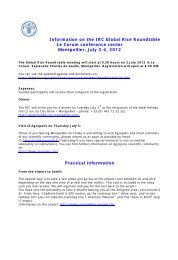Climate Change and Food Security: setting the track for the ... - FAO
Climate Change and Food Security: setting the track for the ... - FAO
Climate Change and Food Security: setting the track for the ... - FAO
Create successful ePaper yourself
Turn your PDF publications into a flip-book with our unique Google optimized e-Paper software.
Best regards<br />
Gerhard Flachowsky<br />
Prof. Dr. G. Flachowsky<br />
Institute of Animal Nutrition<br />
Friedrich-Loeffler-Institute (FLI)<br />
Federal Research Institute <strong>for</strong> Animal Heallth<br />
Germany<br />
61. Geoff Evans, Humane Society International, USA<br />
Dear members of <strong>the</strong> Steering Committee of <strong>the</strong> HLPE,<br />
Humane Society International (HSI) applauds HPLE’s ef<strong>for</strong>ts to study <strong>the</strong> relationship between<br />
climate change <strong>and</strong> food security, specifically <strong>the</strong> opportunities <strong>and</strong> challenges various climate<br />
change mitigation <strong>and</strong> adaptation policies pose to food security <strong>and</strong> nutritional health. Fur<strong>the</strong>r,<br />
we appreciate <strong>the</strong> opportunity to provide input to this important work during your public<br />
comment period.<br />
While HSI appreciates <strong>the</strong> overall breadth of <strong>the</strong> scoping paper, <strong>the</strong> paper omits consideration of<br />
<strong>the</strong> welfare of animals raised <strong>for</strong> food. The approximately 67.5 billion animals raised <strong>for</strong> food<br />
annually both impact <strong>and</strong> are impacted by climate change, <strong>and</strong> climate change policies. Support<br />
<strong>for</strong> high-welfare farming practices—as opposed to low-welfare intensive confinement systems—<br />
is more likely to support food security, small-holder farmers (including women farmers), rural<br />
development, <strong>and</strong> environmental sustainability.<br />
Surveys of public opinion clearly indicate that consumers worldwide care <strong>for</strong> <strong>the</strong> welfare of<br />
animals raised <strong>for</strong> food. <strong>Climate</strong> change policies must consider effects on farm animal welfare.<br />
HSI requests <strong>the</strong> HLPE to take into account <strong>the</strong> climate change <strong>and</strong> policy impacts on <strong>the</strong><br />
welfare of animals raised <strong>for</strong> food, <strong>and</strong> recommend policy solutions that support highanimal-welfare<br />
farming systems.<br />
With specific regard to <strong>the</strong> scoping paper, section 1(a) should, in its evaluation of climate change<br />
impacts on food security, include an evaluation of climate change’s impacts on farm animal<br />
welfare, such as heat-stress-related death. Section 1(c)’s evaluation of <strong>the</strong> limits of agricultural<br />
resources should account <strong>for</strong> <strong>the</strong> relative inefficiency of producing animal products, including<br />
impact on global grain resources. Worldwide, more than 97% of soymeal <strong>and</strong> over 60% of barley<br />
<strong>and</strong> corn go to feed farm animals. Section 4(b)’s analysis of agricultural mitigation options<br />
should also evaluate <strong>the</strong>se options <strong>for</strong> <strong>the</strong>ir impacts on animal welfare, which dovetails into<br />
section 4(d)’s multi-objective policy approach to mitigation. Some of <strong>the</strong> proposed mitigation<br />
options in animal agriculture have <strong>the</strong> potential to lead to wide-scale, negative welfare impacts.<br />
For example, increasing production efficiency in farm animals has led to some of <strong>the</strong> worst<br />
animal welfare effects. And providing financial subsidies to large-scale anaerobic digesters<br />
incentivizes operations that not only severely compromise animal welfare, but harm <strong>the</strong><br />
environment <strong>and</strong> food security, as well. Small-scale biodigesters, however, should be pursued.<br />
Thus, evaluating <strong>the</strong> animal-welfare impacts of agricultural mitigation options would feed<br />
directly into a multi-objective policy approach to mitigation. Section 5 should take <strong>the</strong> <strong>for</strong>egoing<br />
welfare considerations in <strong>the</strong> aggregate <strong>and</strong> promote high-welfare systems, which are more<br />
wont to simultaneously support food security, <strong>the</strong> environment, <strong>and</strong> economic development<br />
goals.<br />
__________________________________<br />
Global Forum on <strong>Food</strong> <strong>Security</strong> <strong>and</strong> Nutrition<br />
http://km.fao.org/fsn<br />
44



